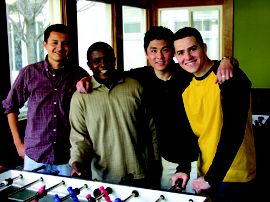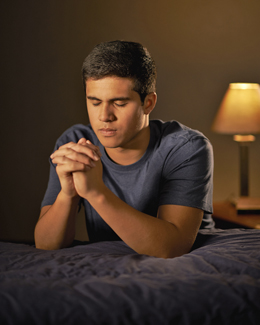“This article originally appeared at MeetMormonMissionaries.org”
During the opening session of the 132nd Semiannual General Conference of The Church of Jesus Christ of Latter-day Saints held in October 2012, President Thomas S. Monson made a landmark announcement to the members of the Church worldwide. He announced that young men may now enter the Missionary Training Center (MTC) after their 18th birthday, and young women may enter after their 19th birthday.
Following that monumental announcement, many young men and women made the decision to place college and careers on hold for 18 months (for the young women) to two years (for the young men) to be about their Heavenly Father’s business by serving a full-time mission for The Church of Jesus Christ. While on the Lord’s errand, they put the cares of the world behind them as they devote all of their time and attention to strengthening their relationship with Heavenly Father, praying fervently, studying the scriptures, and serving and teaching the gospel of Jesus Christ to the people in their assigned areas.
However, there comes a day when the mission is over. There comes a time when they are released as full-time missionaries, and return home to their families and loved ones. As they return and report about their life changing experiences, the indelible question that perhaps weighs on their mind is, “What happens now that I am home from my mission?”
Transitioning from the Missionary Life to the “Normal” Life
A young returned missionary from Canada described his experience with returning home after serving a two year mission:
Coming home after serving my full-time mission was harder than leaving home had been,” said a young Canadian returned missionary. “I’m usually not an emotional person,” he added, “but during the first months after I returned home, I felt a great deal of emotion. Often I didn’t understand my mixed-up feelings. At times, I would go to bed at night and cry. I was embarrassed and put on a front for my family and friends because I didn’t want them to know.
 Bruce L. Olsen, director of Public Affairs for The Church of Jesus Christ of Latter-day Saints from 1989 to 2008, stated in an address given in 1991, that it is not uncommon for returned missionaries to feel somewhat at a loss as they transition from a life where they had the opportunity to serve as full-time ambassadors for the Lord Jesus Christ back to a life at home, where they have to deal with day-to-day challenges. He encouraged those who had already returned home from their missions, as well as those who would soon be returning, to be patient with themselves, and in time they would make a successful transition.
Bruce L. Olsen, director of Public Affairs for The Church of Jesus Christ of Latter-day Saints from 1989 to 2008, stated in an address given in 1991, that it is not uncommon for returned missionaries to feel somewhat at a loss as they transition from a life where they had the opportunity to serve as full-time ambassadors for the Lord Jesus Christ back to a life at home, where they have to deal with day-to-day challenges. He encouraged those who had already returned home from their missions, as well as those who would soon be returning, to be patient with themselves, and in time they would make a successful transition.
Some returned missionaries, for a period of time as they strive to readjust to “normal” life, may feel as though they are on an incredible roller coaster ride. A mental health advisor with the Church Missionary Department described the experience of returning home as follows:
Returning from a faithfully served mission is a singular experience. You’re about as happy and satisfied as it’s possible to be. You’re also as tired as you’ve ever been, and there’s an amount of sorrow: it can be a lot harder to come home than it was to leave.
A former Mission President’s wife and an LDS psychologist with Sixteen Stones Center for Growth, Wendy Ulrich, also commented,
For many missionaries, this can be a bittersweet experience. It can be hard to leave behind the people and work you love dearly, a new understanding of who you are, and a structure to your days. RMs (Returned Missionaries) can quickly find themselves looking for something to give meaning to their lives again.
Another Church Missionary Department spokesman further commented,
Young returnees can be caught off guard by the complexity of post-mission life. Your lifestyle literally changes overnight. While you served, you only had to worry about one thing. The work was not easy, but once you settled in, the daily schedule became a manageable, simplistic life. Then you go home and it’s not that way anymore. Your life suddenly has a number of dimensions: dating and finding a spouse, school, job, money, cars. It can create angst in the returned missionary who suddenly has a million decisions to make every day.
Senior missionaries face challenges, too. Seniors often develop rich, robust relationships and feel very valued as missionaries for the role they play. When they come home, it is hard for them to replicate that feeling of being valued by the ward or community.
Mormon Missionaries Who Return Home Early
 Even missionaries of the most stalwart faith may experience some feelings of regret, especially as they begin to wonder if the service that they rendered was sufficient. There may even be feelings of deep remorse and guilt as they look back over their missionary experience and realize that they may not had accomplished all that they had hoped to do. Those feelings are perhaps felt more profoundly by those who are sent home early from their mission because of medical or other reasons. In addition to those feelings, there is also the fear of rejection or judgment by others. The reality is that many missionaries who return home early from their mission feel a sense of failure.
Even missionaries of the most stalwart faith may experience some feelings of regret, especially as they begin to wonder if the service that they rendered was sufficient. There may even be feelings of deep remorse and guilt as they look back over their missionary experience and realize that they may not had accomplished all that they had hoped to do. Those feelings are perhaps felt more profoundly by those who are sent home early from their mission because of medical or other reasons. In addition to those feelings, there is also the fear of rejection or judgment by others. The reality is that many missionaries who return home early from their mission feel a sense of failure.
Zach Bullock experienced these feelings when he returned home in 2008 after serving seven months of a two-year mission call to Italy. Upon returning home, he never bothered to unpack his suitcase, and immediately found a job that required him to work on Sundays so that he could avoid church meetings and having to talk to people at Church about his mission. He eventually completed a degree in social work at Utah Valley University, but soon became obsessed with the idea that he needed to complete a Master’s degree to somehow prove that he could finish something important. Commenting on the experience, Bullock, now a BYU graduate, stated, “I didn’t feel normal. I feel like I failed.” Two years short of leaving for his mission his father passed away from stomach cancer. His father’s dying wish was that his son would serve a mission. In retrospect, Bullock commented, “I thought I had dealt with his death, but it turned out I hadn’t gotten over it.”
The late Church President Gordon B. Hinckley in a 2003 Worldwide Leadership Training broadcast commented on the importance of good physical and mental health:
Good physical and mental health is vital. There are parents who say, ‘If only we can get Johnny on a mission, then the Lord will bless him with health.’ It seems not to work out that way. Rather, whatever ailment or physical or mental shortcoming a missionary has when he comes into the field only becomes aggravated under the stress of the work.
There must be health and strength, both physical and mental, for the work is demanding, the hours are long, and the stress can be heavy.
Help With the Transition Process
 In reference to missionaries who return early from their missions because of health or other problems, Elder Jeffrey R. Holland, of the Quorum of the Twelve Apostles, in his October 2013 General Conference address titled “Like a Broken Vessel” stated, “Broken minds can be healed just the way broken bones and broken hearts are healed. While God is at work making those repairs, the rest of us can help by being merciful, nonjudgmental and kind.” Therefore, members of the congregation need to be less judgmental, and more warm and accepting of returned missionaries, whether they were able to serve a full mission or not.
In reference to missionaries who return early from their missions because of health or other problems, Elder Jeffrey R. Holland, of the Quorum of the Twelve Apostles, in his October 2013 General Conference address titled “Like a Broken Vessel” stated, “Broken minds can be healed just the way broken bones and broken hearts are healed. While God is at work making those repairs, the rest of us can help by being merciful, nonjudgmental and kind.” Therefore, members of the congregation need to be less judgmental, and more warm and accepting of returned missionaries, whether they were able to serve a full mission or not.
The returned missionary can also help lessen the stress and confusion they may feel after returning home by becoming actively involved in their wards and branches. They should also find good friends, Church leaders who will take the time to listen, as well as close family members to share their feelings with.
Bruce L. Olsen in his address titled “Home from a Mission” counseled,
Establish a pattern of steadfastness in the gospel and serve well in whatever Church service to which you are called. Talk about your feelings with your parents, Bishop, Relief Society President, or home teachers. And remember, baptisms are not the only measure of a successful mission. Equally important are helping to fellowship new members of the Church, encouraging less-active members toward full activity in the Church, giving Christian service, planting for a future gospel harvest, helping companions, and deepening your own conversion.
Advice for Returned Missionaries
 LDS psychologist, Wendy Ulrich, suggests that the first thing returned missionaries need is a vacation – a time to relax and unwind. They have basically gone non-stop during their time of missionary service and need a small break, but she also suggests that the break should not last longer than a couple of weeks. As soon as possible, they should begin to look for something concrete to do.
LDS psychologist, Wendy Ulrich, suggests that the first thing returned missionaries need is a vacation – a time to relax and unwind. They have basically gone non-stop during their time of missionary service and need a small break, but she also suggests that the break should not last longer than a couple of weeks. As soon as possible, they should begin to look for something concrete to do.
She also suggest that there needs to be a shift in spiritual thinking, “Instead of being in the middle of God’s work, you have to bring God into your work—the work of preparing for your future.” She continues, “Keep communicating with the Lord. Be patient: answers to prayers may not come as quickly or directly. But the Spirit isn’t going to leave you just because you’re not baptizing people.”
She encourages those who come home early from their mission to accept their release and keep pressing forward by faith. She further commented that coming home early “is not the defining experience of your life. It can be lonely. But the Lord will find ways to use every experience of our lives for our good.”
A Missionary Department representative offered this counsel for returned missionaries:
Don’t forsake everything in the spiritual dimension of your life. Maintain a high degree of spirituality in public and private religious practice. Strongly urge your Bishop to give you a calling—and then magnify it.
